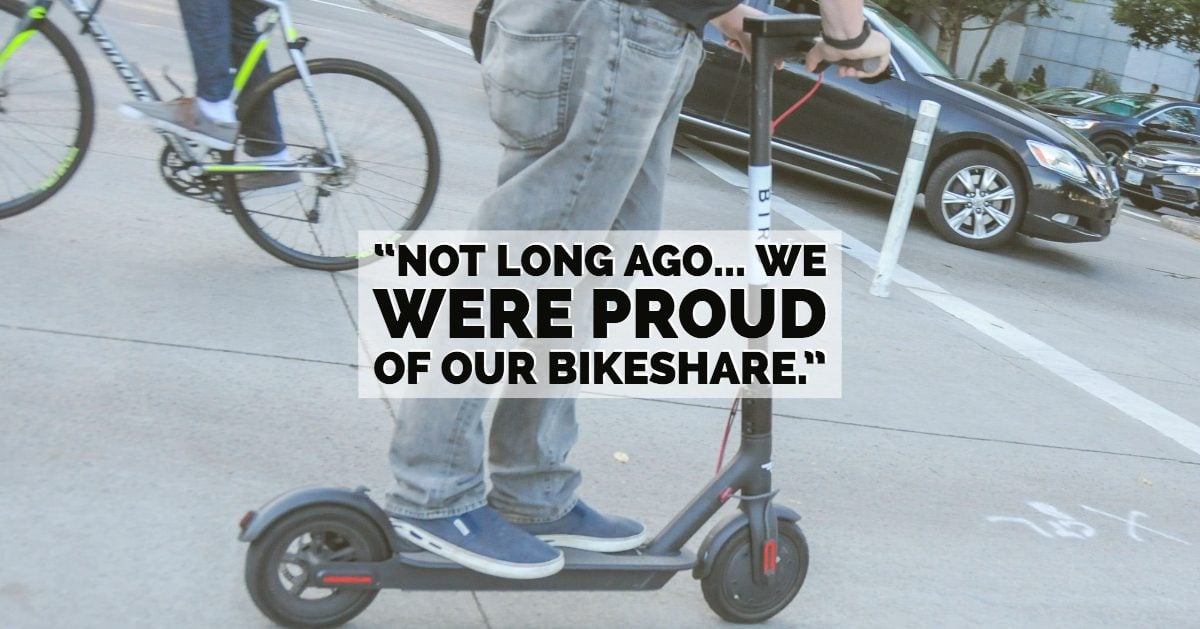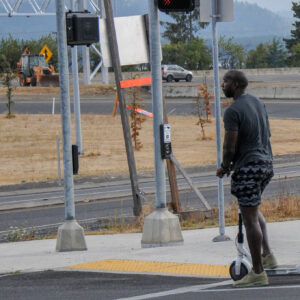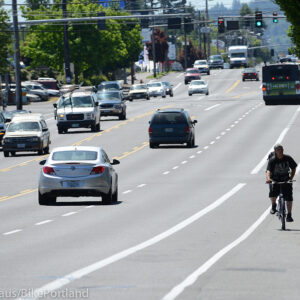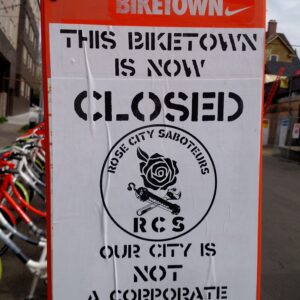Our post last week about new keypads coming to the Biketown fleet led to a discussion about the future of the orange bikes.
Commenter John Liu sounded an alarm. He said this website and “other cheerleaders of dockless and e-sharebikes” will shoulder the blame if Biketown ends up in the scrap heap. Here’s his comment:
BP [BikePortland] and other cheerleaders of dockless and e-sharebikes will be responsible for Biketown’s demise if that sad day comes.
Not long ago, we had a good bikeshare system that was working well and expanding in a thoughtful, measured way. Our city had worked for this for a long time. The bikes were high quality and sturdy. We were proud of our bikeshare.
Then this blog and others got enamored with the shiny new toy. Dockless! Electric! Thousands and thousands of dockless e-sharebikes, appearing on every corner, through the magic of tech venture capital! Throw out those clunky old Biketown bikes! We don’t want to work at pedaling or get any exercise at all! Cross the “active” out of “active transportation”! Promise us anything! Bring in Lime and Ofo, Spin and the rest, throw the doors wide open to the next new thing! Force Biketown to go full dockless, to expand faster than it was ready to, leaving orange bikes scattered far and wide. Don’t be patient and see how it works out for other cities before upending our own applecart. We have to jump on every bandwagon!
Advertisement
It was obvious what was going to happen. Most of the new bikeshare companies will go bust. The e-sharebikes will prove too expensive to recharge and maintain. Bikes will get stranded far from high usage areas with dead batteries. Rebalancing will be very costly. Thousands of dockless bikes will be dumped in landfills. Cities will end up with one monopoly e-sharebike company, if that. Prices will go up, way up. Service levels will go down. Customers will find that they, not the sharebikes, are the product. We talked about all this in the past year, but too many were and are willing to uncritically swallow the tech-bro marketing lines.
We are repeating the mistake with the e-scooters. Venture capital funded companies burning cash for marketshare, promising every possible benefit except actual physical exercise.
I feel this comment is worth highlighting for several reasons: It’s well thought-out, shows knowledge of the subject, demonstrates strong interest in the topic, and it bravely offers an opinion that runs counter to a prevailing wind. I appreciate how Mr. Liu did not go overboard and lob personal insults toward people that disagree with him. This is a good example of how to share an opinion — even when it’s clearly something you’re passionate about and it’s likely to be divisive and/or unpopular with other readers.
Thank you John. I value your comments and hope to read more from you in the future. (If you’re curious, I responded to his comment here.)
p.s. Please help us keep our comment section productive and welcoming to all. Let’s keep the focus on the message and not the messenger. Our national dialogue is so toxic right now, let’s prevent that from seeping into our interactions here. If you think someone has been abusive or inappropriate, please let me know and I’ll take a closer look at their comment(s).
— Jonathan Maus: (503) 706-8804, @jonathan_maus on Twitter and jonathan@bikeportland.org
Never miss a story. Sign-up for the daily BP Headlines email.
BikePortland needs your support.








Thanks for reading.
BikePortland has served this community with independent community journalism since 2005. We rely on subscriptions from readers like you to survive. Your financial support is vital in keeping this valuable resource alive and well.
Please subscribe today to strengthen and expand our work.
I appreciate the shout-out. BP is an invaluable and irreplaceable hub for bike news, culture, and advocacy in Portland.
It is also a great place to exchange ideas because our commenters (or is that “commentors”? spellcheck tells me neither is correct and prefers “commentators” but that doesn’t feel right) are informed and civil.
I’ll put in an unsolicited pitch to support this website. Portland would be a poorer place without it.
I prefer using xxxor for a person, and xxxer for a machine or device. I can’t be positive which you are, so choose accordingly.
Does …not…compute
Commentor for a person, commenter for a device that makes comments.
A rare “woosh” for Hello Kitty!
Dang!
I thought the whole point was less focus on cars? Whether a bike share or scooter, it’s all less cars.
Older people I know want to ride bikes but start to get pain and have less stamina. They love e-bikes for this reason. They want pedal assist.
Then there are the teens who just want to hop on something, whether scooter or bike. I think comments about the VC funded scoots are valid but it certainly seems like a curmudgeon outlook.
Biketown has a major sponsor in the form of NIKE, which means that like many transportation endeavors in Portland, it can’t sustain itself based purely on revenue. “The deal is worth $10 million and will last for five years. PBOT had previously said they needed $2 to $8 million to launch the system, so this is a huge deal for the city.” https://bikeportland.org/2016/01/07/nike-becomes-sponsor-of-portland-bike-share-171981
On the other hand, you actually have companies who are attempting to make all their money on the use of their transportation, such as Lime and the other scootz pushers. If they win out it may simply be due to the pressure to get revenue.
I see these things as options to make not using a car more convenient, which would be the ultimate win whether people get exercise, assisted exercise, or minimal exercise.
“I thought the whole point was less focus on cars? Whether a bike share or scooter, it’s all less cars.”
Well, once upon a time the whole bike, scoot, skate thing wasn’t motorized. Now that this has changed it isn’t quite so simple anymore, is it?
“I see these things as options to make not using a car more convenient, which would be the ultimate win whether people get exercise, assisted exercise, or minimal exercise.”
I’m more of a curmudgeon, but good for you.
“I see these things as options to make not using a car more convenient, which would be the ultimate win whether people get exercise, assisted exercise, or minimal exercise.”
I politely disagree.
Anytime a big corporation gets involved, they want two things:
Branding rights; and
the increased revenue that comes from “cornering” a market.
This has far less to do with getting people out of cars and far more to do with selling branded product.
Nike did not sign on for this out of the goodness of anyone’s heart, nor out of concern for a better, cleaner environment. They did it to Sell More Nike Stuff.
The city signed on because the saw a dangling carrot for increased tourism, which also brings in more revenue.
All of these companies creating and placing bike- and scooter-share products are out to make money. The goodness of anyone’s heart doesn’t weight into this nearly as much as folks want to believe. When car ownership is most costly and less convenient, THEN people will drive less.
We saw it happen in the bike-boom of 2007-8, and we’ll see it again next time we dive into deep recessionary waters.
Tourism and fashion aren’t going to get enough people out of their cars more often enough to make a real, long-term difference. Only a radical change in the way we fund transportation — and which transportation choices we fund the most — will make that happen.
Now we’re talking.
all of these scooter folks will be back in Uber and Lyft cars once it starts raining…
umm, you make this post but dont bother to acknowledge that his comment was putting some of the onus on you? no retort?
yarp,
I did have a response… Which I posted to his original comment here.
I’m surprised at your praise for the tone of this comment when it includes such an exaggerated and false representation of the perspective he’s countering:
“We don’t want to work at pedaling or get any exercise at all! Cross the ‘active’ out of ‘active transportation’! Promise us anything!”
He’s essentially calling e-bike riders lazy and entitled here, which is a bummer considering the positive impact e-bikes can have on equity. I hope it’s unnecessary for me to point out that someone considering using bikeshare may be older, or have a disability, or have a heavy load to carry, or be coming from a job involving physical labor, or be on the way to an intense workout, or simply be tired.
He could have made his point about patient planning and logistics without this harmful portrayal.
Hall,
He’s sharing his opinion. I don’t agree with it at all, but it’s his opinion.
It sounds like you and I agree about e-bikes in general… As I’ve written several times on this site over the years, I am a strong advocate for e-bikes for all the reasons you list above.
And yes, it’s not a perfect comment by any stretch. But I don’t expect perfection and I embrace the fact that open forums (which is what I’m trying to create here) are messy. I want comments to reflect emotion and reflect the realities of the agora where everyone has a chance to share their opinions — as long as they do so within certain bounds of respect for others.
And FWIW there’s a big difference between John saying that e-bike riders (in general) don’t want to be active (which is an opinion), versus John saying that a specific commenter is lazy (which is an insult). Had he done the latter I would have deleted/edited his comment.
To be fair he said there was no “personal” insult in the comment. There is that broader wide-ranging insult that you pointed out, though.
“I hope it’s unnecessary for me to point out that someone considering using bikeshare may be older, or have a disability, or have a heavy load to carry, or be coming from a job involving physical labor, or be on the way to an intense workout, or simply be tired.”
I find this line of argument, common as it is, very telling. Most of the folks who use e-bikes, or are interested in trying them I’d venture don’t fit those profiles you list. Most people who use power tools—to offer a parallel case—aren’t old or infirm or tired either, they just want to get the shelf built, or have no experience using hand tools, or like the way power tools make them feel. Why do we so consistently invoke the marginal case to argue that e-bikes are…. Valuable? Necessary? Unavoidable?
It seems that almost no one here is open to what John is saying in that passage. But I think it is important: motorized bikes, scooters, or whatever are categorically different from their pedal powered cousins. And to pretend otherwise seems, well, curious.
I might be wrong, but does John’s detailed and well thought out comment seem to be predicting the doom of Biketown and then soon after the death of the dockless e-scooters and e-bikes that he calculates will push it aside. Thus, his ultimate prediction is that we will end up back in the old days when we just ride our own bikes and perhaps rent one from a kiosk on the riverfront or brick and mortar location around town.
This is exactly what he is arguing. That the VC-backed e-thing thing will drive all of bikeshare into the ground, and we’ll be left with nothing.
Heard today about the skyrocketing cost of replacement rechargeable batteries, which are already costly. Most are made in China, which shares the market with Japan. Tariffs are expected to jump the cost 25-30%. Sorry, no rechargeables or rechargers are made in America as far as I know. Not even for Tesla.
Owning and maintaining electric forklifts for 30 years has taught me that the elephant in the room with all rechargeable electric vehicles is the cost of replacing the batteries when they wear out. Both new tech and old tech batteries are just a collection of expensive materials and energy, neither of which is improved upon by Moore’s law. We are entering a future where both energy and materials will become scarcer and more expensive as time goes on. This is the fulcrum upon which utopian dreams of cheap rechargeable transportation will flounder.
Renewable energy is getting cheaper, quickly. (And yes, you’ll remind me that human-powered transport is the cheapest and most efficient of all, but if an e-bike replaces a car, that’s a substantial energy savings.)
For the time being, batteries do use expensive materials that are getting scarcer, and also are mined via serious human rights issues. (e.g., child labor cobalt mines in DRC). But I think you have your head in the sand to think this will end rechargeable transportation. There’s a huge market for new battery technologies to avoid rare earth metals. And, as can be expected, researchers and companies are not far from delivering (for just one example: https://sydney.edu.au/news-opinion/news/2017/08/15/university-of-sydney-charges-ahead-on-zinc-air-batteries.html)
Although an e-bike user, I am by no means a cheerleader. While I can dream of a manual bike powered world, I can also look forward to a reality that is a substantial improvement on the status quo.
electric engines are far more efficent than muscle-powered transportation.
You’ve flogged this one here for years, soren. It is one of those bits of dangerous flattery that reassures people that nothing can or should be done (about in this case the fossil fuel signature of some putative average North American diet).
What would be far more useful and constructive is to describe the diet that would right this absurd situation whereby the food (some of us) eat has such a high carbon signature that your statement might actually be true.
You are presenting decarbonization of animal agriculture and decarbonization of transportation as binary choices. I disagree and have consistently argued that a switch to a mostly vegan diet is essential to ameliorating ongoing global ecocide. (I personally made this switch in the late 80s.)
You wrote without qualification that electric propulsion was “far more efficent” than human locomotion. This is what I was calling out.
“You are presenting decarbonization of animal agriculture and decarbonization of transportation as binary choices.”
I don’t know what that means.
Human locomotion isn’t inherently about fossil carbon, and neither is eating low on the food chain. So why are you so determined to celebrate lithium extraction and electric propulsion? Use them as sticks to beat human locomotion?
And if a vegan diet upsets your spurious claim that electric propulsion is superior to human locomotion, why not skip it, or give us a fuller picture rather than the skewed one?
For people who are not convinced they can be satisfied with vegetarian fare, I challenge you to try the Impossible Burger (available at many locations in Portland: https://impossiblefoods.com/locations). It’s vegan, and, as a victim of many unsatisfying veggie burgers, I believe this one will satisfy most carnivorous palates.
It’s better with real cheese (New Seasons uses vegan cheese), but even still, you will not be disappointed.
Hello, Kitty guarantees it!
I don’t think anybody expects the future to happen with today’s battery technology. We’re still using 2000 year old battery tech. Once we make a recent breakthrough in power storage we can move into the next era of energy production.
Like Nuclear Fusion, cheap, non-polluting, high density batteries are 20 years in the future and always will be.
Don’t be too sure. For nearly a century, batteries with enough energy density to support automobiles with a 100-mile range were always 20 years into the future too.
And now they’re in the past.
Not so fast with the victory laps.
We’re still up against the inexorably declining energy return on energy invested. No way around that, and no gadgets or discoveries are going to change this fundamental shift.
“At the societal level, declining EROI means that an increasing proportion of energy output and economic activity must be diverted to attaining the energy needed to run an economy, leaving less discretionary funds available for “non-essential” purchases which often drive growth. The declining EROI of traditional fossil fuel energy sources and the effect of that on the world economy are likely to result in a myriad of consequences, most of which will not be perceived as good.”
https://www.sciencedirect.com/science/article/pii/S0301421513003856
Batteries are not an energy source. They are a storage mechanism. Though you and I may disagree on the implications, we agree that humanity will likely have to learn to live with less energy at some time in the next few decades. But that doesn’t mean we won’t solve the more tactical problem of scarce elements like Lithium currently required for battery electric vehicles.
If we develop no new energy sources in the next few decades, it will be a colossal failure of engineering.
New energy sources may well be developed. They just won’t have anywhere nar the energy density (EROI) of the early days of fossil fuels, which are responsible for our level of comfort, amenities, machines that do the work for us, etc,
How can you know that? Those sources haven’t been invented yet!
Well, I think the onus is on you and your techno-optimist friends to show how you are going to buck the 150-yr decline in EROI since the first gushers were discovered.
I have to show nothing. It will happen, or not. I believe it is inevitable. You are free to conclude differently.
You have to show nothing, or you have nothing to show?
“scarce elements like Lithium”
lithium is not a scarce resource. annual consumption is currently ~37,000 metric tons and total estimated resources are estimated to be 53,000,000+ metric tones (and many of orders of magnitude higher if less concentrated sources are included).
https://pubs.er.usgs.gov/publication/pp1802K
From the abstract: “which is enough to meet projected demand to the year 2100.”
How reassuring. It is also rather different than your math would have us believe.
this just in:
from Wired Magazine, of all places:
The spiralling environmental cost of our lithium battery addiction
As the world scrambles to replace fossil fuels with clean energy, the environmental impact of finding all the lithium required could become a major issue in its own right
https://www.wired.co.uk/article/lithium-batteries-environment-impact
Lithium polymer battery manufacturers would probably disagree…
Unless I’m mistaken, e-scooters are in Portland on a trial basis. Aren’t they all going to turn back into pumpkins at the strike of Halloween?
Won’t there be time to sort through the data, evaluate the impact of these in the winter months and address John Liu’s concerns? Why the rush to judgment?
PBOT just said it was a trial to add a veneer of public process to the e-scooter launch. Rest assured that despite a predictable finding that the e-scooter companies are not meeting their required East Portland distribution requirements, that the city will permanently renew the companies’ permits anyway.
Not that Portland Bike Share ever got out to East Portland either…
What I find most odd about Portland’s version of Bike Share is how little it has invested in East Portland. Soon after LimeBike moved here to Greensboro NC, many of their most popular use areas were in our poorest black neighborhoods on the east and south sides (downwind from the smelly factories of past decades now long gone, the places where blacks were allowed to live.) Finally folks could afford to use a bike and not worry about maintenance and theft. And use them they have, in droves. Now we have birds everywhere.
Yet nice white liberal Portland only supplies bike share in affluent near-downtown areas. WTF?
As a resident of East Portland, it’s been incredibly easy to dismiss BIKETOWN. Haven’t found a use yet for it, even though I work and play in the service area. Hard not to see it as anything other than an amenity for tourists when that’s the majority of the ridership I see downtown every day.
Columbo, what’s really amazing about dockless bike share is that it quickly identifies locations of where the greatest latent demand is for new bike facilities, irregardless of political squeaky wheels or membership on advisory boards. For our city, which normally has pathetic bike facilities and virtually no riders except in wealthy white neighborhoods and around universities, it has been politically transformative. No longer do we hear from local electeds and bureaucratic staff that “they don’t see any bicyclists.” Now they do, on obnoxiously bright green and yellow reflective bikes. City staff have been much more speedy about implementing bike and ped projects wherever bike share usage is highest, which data Limebike has been very forthcoming about supplying to our city. And our highest use has been in the black neighborhoods surrounding A&T, an area the city has historically neglected as those neighborhoods are very poor and have the highest crime rates, a bit like East Portland.
The other consequence of bike share in general but specifically dockless bike share is on local bike sales. On the long-term, dockless bike share increases local bicycle demand for good-quality bike ownership. At first many shops saw bike share as a threat, but most shop owners quickly realized that while most consumers were not buying their bicycles, they were still buying bicycles, but cheap junk from Walmart & Target. Briefly, even these sales declined. However there has been a recent upsurge is $300-$600 new bike sales from a far larger customer base. Basically, bike share has allowed for a greater variety of people of lower income to try bicycling without the onerous burden of purchase and secure storage. Now that they have tried it and liked it, many are now buying better bikes than what LimeBike offers and are being more conscientious about bike locking and maintenance. Locally this is more true of working-class blacks than it is of students of any race.
You can look at the vigor and ferocity with which the city responded to companies like Uber and Airbnb when they flouted the rules to get a sense of what the e-scooter folks are in for. Look out! Don’t mess with Portland!
Excellent idea:
Go trick-or-treating on escoots and observe if they all turn into pumpkins on 1 November 2018.
If Biketown ends up on the scrap heap I really don’t think this blog will deserve any share of the blame, even though it has been mildly enthusiastic about e scooters and bikes. From what I have seen,on the streets ,the 98% of the folks who have been plunking down their digital cash to ride these personal transport schemes have never heard of Bike Portland let alone ever read it. Most of them don’t look, to me ,to be deep transportation thinkers or activists and only use them because they see them fun and easy.
A comment that includes “tech-bro” sure sounds like it’s lobbing personal insults to me.
Who’s the person in this personal insult?
It doesn’t have to be literally aimed at one person to be a personal insult.
hurry up rain lol.. fair weather scooter life haha
Thank you, Mr. Liu. I have thought many of the same thoughts.
As I mentioned in the other thread, e-bike share and e-scooter share can only be sustainable and equitable if there are docks that charge the bikes when parked. And by sustainable, I mean financially. I dont know enough about the waste and production of batteries to comment on those.
A model that requires random people to drive around and throw scooters in their truck every night to charge them at home makes zero sense in the long run.
…which is why so many companies have already failed in the year or so this stuff has been around
I recommend reading about the Arlington, Texas transit experiment. They had zero transit. Then they started a single bus line that carries something like 1,000 people a day. They called it a failure, threw it out, and welcomed in VC funded “micro transit”. Right now, theyre calling it a huge success because the city is paying much less…but theyre only moving 300 people now! A service that carries 300 a day isnt long for the world, and when the VC company bails, Arlington is left with zero bus service.
I think thats John’s prediction of what can happen with bike share. Another place to watch is Baltimore. They brough in a docked bike share system new to the US market. All the bikes were stolen because their locks were crap. Now theyre gone, and dockless bikes are in. Lets see if that lasts
Why do we need docks for the sake of “equity”? This is another term that’s being overused to the point of uselessness.
How will a person who can’t afford a cell phone find a ride if there’s no central depository?
A system that is highly expensive to operate because of large labor demands (manually recharging) will either fail, or charge high prices. A system that charges high prices is not equitable.
There will always be some who find any given price to be too high, therefore everything not free and without any barriers to access is inherently inequitable. This thinking is simplistic.
If a dockless system provides more utility than a docked one (I don’t claim it does), then it may be worth paying more for. If a dockless system provides more access to the service and more utility in lower income areas, it may in fact be more equitable, even if it is more expensive.
WHERE ARE THE RASCALS FOR RENT BY APP MY KNEES R ACHIN FROM SHREDDIN A BIRD SCOOTER IN BURNSIDE ALL DAY
Seriously!! Has no one seen WALL-E?!
Rechargeable batteries are only good for about 400+/- recharges under ideal conditions. And with the skyrocketing cost of replacements (thanks, tariffs), this “great experiment in personal transportation appears doomed.
And the tariffs are nowhere near high enough.
As a 70 year old, I appreciate the easy option of shared scooters and e-bikes. No sweat.
But after the VCs and early adopters have had their fling, let’s make room for shared neighborhood bike hubs. Better. Cheaper. Local.
Look what happened to Seattle. They had 3 bike share programs. Limebike, Ofo, and Spin. The City of Seattle saw a revenue stream and raised the permit fees. Because of that, two of them jump ship siting that the new permit fees did not align with the rate structure and they would not be competitive with the other companies if they passed the permit fees onto the consumer. Now the only bikeshare in Seattle is Limebike. I think it will be just a matter of time until the rates increase since Limebike practically has a monopoly in Seattle for dockless bikeshare.
Meant to reply here. They just jacked up prices by more than 100%. Good call.
https://www.thestranger.com/slog/2018/09/21/32691116/lime-bike-raises-prices-after-competitor-leaves-town
Just as Uber and Lyft will do as soon as they’ve eliminated competition from their regulated predecessors in the taxi industry.
Sure it sucked having to wait 45 minutes for a cab at bar time, but is it any better now that surge pricing makes that same ride cost 4x as expensive?
It doesn’t help that a significant portion of the bike town bikes are unusable because of the keypads. Even when they do work, it is a frustrating game of push push push and then hitting back back back when it finally registers. Glad to hear they are fixing this and I hope it doesn’t go away because it is so much more usable now that they have gotten rid of the hub system.
Hey Jonathan – As you saw I put together a polite, but pointed, critique of the ideas surrounding the topic of this post. Why not post the comment? What gives?
Emerson,
I’m not seeing that comment. Happy to post it.
And here it is. In Seattle Lime jacked up prices from $1 for 30 minutes to $2.50 for the same time as soon as their competitors bailed from the market.
https://www.thestranger.com/slog/2018/09/21/32691116/lime-bike-raises-prices-after-competitor-leaves-town
Or political will.
Look at the trouble people in Las Vegas and Honolulu are having putting grid tied systems in. At some point it does become an infrastructure issue, but no one is willing to upgrade it -not the electric company losing money, and not the government either.